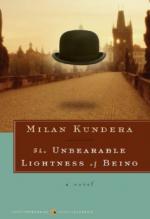|
This section contains 3,327 words (approx. 12 pages at 300 words per page) |

|
SOURCE: "Kundera and Kitsch," in London Review of Books, Vol. 6, No. 10, June 7-20, 1984, pp. 18-19.
Below, Bayley explains the meaning and use of "kitsch" in the context of The Unbearable Lightness of Being.
There is always comedy in the ways in which we are impressed by a novel. It can either impress us (if, that is, it is one of the very good ones) with the sort of truths that Nietzsche, Kafka and Dostoevsky tell us, or with the truths that Tolstoy and Trollope tell us. To the first kind we respond with amazement and delight, awe even. 'Of course that's it! Of course that's it!' The second kind of truths are more sober, more laboriously constructed, more ultimately reassuring. They are the truths necessary for fiction, and therefore necessary for life. The first kind contribute brilliantly not to life itself but to what seems an understanding...
|
This section contains 3,327 words (approx. 12 pages at 300 words per page) |

|


